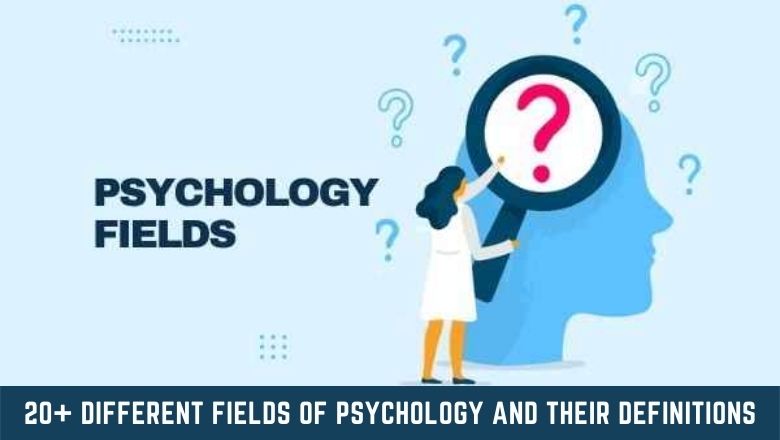Different Fields/Branches of Psychology Explained
There are many subfields of psychology, each with its own distinct characteristics. This article aims to discuss all the important different fields of psychology and their definitions.
Table of Contents
As discussed in the previous article, people have defined psychology differently according to their views in “Introduction to psychology” and “History of psychology.”.
Considering that all fields of psychology cannot be merged into one, psychology is classified into many branches. In this article, we will discuss all of them.
Use and Importance of Subfields of Psychology:
There is a unique application and advantage for each type, and it is suitable for the right place for the right person.
Each type of psychology has its own researchers and psychologists who work on a specific and specialized aspect of that psychology.
It will help us to understand different fields and carriers of psychology through this subdivision.
Let me now discuss all branches of psychology and their definitions one by one.
Different Fields of Psychology and their Definition:
1: Abnormal Psychology:
Normally, the word “abnormal” refers to something that isn’t normal or not occurring regularly.
Abnormal behavior does not conform to the rules. In our society, abnormal behavior is also behavior that doesn’t meet expectations. People like these need to be dealt with immediately. In Abnormal Psychology, all such behaviors are studied.
People’s unusual behaviors fall under this branch of psychology. Psychologists try to figure out why and what caused the abnormality, then discover what is the most effective way to get them back to normal.
Clinical treatment is required for these patients.
2: Biological Psychology:
Biology, as we know, is a study of life.
It is called biological psychology when biology and psychology are combined. Psychobiology and physiological psychology are also terms used for it.
It analyzes behavior from a biological standpoint. The nervous system influences behavior here.
The field of biological psychology aims to understand human behavior by studying the brain.
3: Child Psychology:
The study of children’s behavior and mentality is the main focus of child psychology. Children’s psychology focuses on their physical, mental, emotional, and social development.
Child psychology is one of the most complex branches of psychology.
A child psychologist works in a variety of ways:
- Abnormal child psychologist.
- Developmental Psychologists.
- School and Educational Psychologists.
4: Clinical Psychology:
Clinical refers to the observation, therapy, and treatment of a sick person. From a medical perspective, clinical psychology is important.
Clinical psychology deals mainly with the involvement of mental sickness and abnormal behavior in the treatment of individual patients.
In these cases, Psychiatrists treat the patient’s symptoms using medicines instead of Psychologists.
My great recommendation would be to take on this field if you are interested in the medical field and don’t have the skills to begin in another medical field.
5: Cognitive Psychology:
Cognitive refers to something that relates to cognition. It is a process that involves experiments and observations to gain a better understanding of someone’s thoughts, perceptions, emotions, etc.
Psychologically, cognitive psychology is the study of a person’s mental development, such as their sense of memory, their perspective on things, their creativity, and their perception in various ways.
6: Comparative Psychology:
Altogether Comparative psychology refers to the study of animals. In comparative psychology, we study the psychology of animals. We study the mental level and behavior of animals apart from human beings.
Generally, psychology focuses on human nature and behavior, but comparative psychology is the field most associated with the study of animals that share many traits with humans.
7: Community Psychology:
The term community is probably familiar to all my readers. In a nutshell, community refers to the society we live in.
The concept of community psychology tells us how society and human beings are related. Individuals are greatly influenced by society.
Community psychology mainly focuses on the problems of society and many other factors that can directly or indirectly affect the lives of individuals.
Community psychology is concerned with the rights of its members and seeks solutions to their problems.
8: Counseling Psychology:
By counseling, I mean giving advice or recommending something.
Counseling psychology addresses the normal problems people face, such as taking advice on career choices.
Counseling psychologists also help people suffering from stress or depression. By helping them recover from traumas, they lead them down the path to a normal life.
9: Developmental Psychology:
A developmental psychologist studies a person’s development during their entire life cycle. Besides physical growth and development, it also includes mental, social, emotional, psychological, and intellectual growth.
The objective of developmental psychology is to understand how and why humans change with time.
10: Educational Psychology:
The field of educational psychology studies the process of how humans learn. This field studies human learning from both a cognitive as well as a behavioral viewpoint.
In this field, the human execution of learning is studied.
11: Environmental Psychology:
Human behavior and the environment are interconnected in environmental psychology. It is concerned with how the environment affects humans.
12: Forensic Psychology:
In forensic psychology, you combine psychological knowledge with an understanding of the law.
Essentially, it is the relationship between psychology and social justice. It mainly deals with criminal matters.
13: Health Psychology:
In essence, health psychology relates to our health sector. Health psychology looks into the effects of our behavior and our social environment on our health.
Besides examining the mental condition of a patient, the health psychologist also studies the reason why a person isn’t following proper medications prescribed by his or her doctor if they have a disease and are receiving proper medical treatment.
14: Media Psychology:
The psychology of media focuses mainly on how media affects human behavior. A media psychologist studies how people interact with and react to the media and the impact the media has on our society.
15: Personality Psychology:
Psychologists study how one’s personality and its different elements are different for different individuals, which is called Personality Psychology.
Personality psychology aims to examine how feelings, thoughts, emotions, expressions, and behaviors relate to someone’s identity.
16: Social Psychology:
Social psychology focuses on the interaction between society and human beings. This field is concerned with how humans are affected by their social environments.
17. Family Psychology:
Family psychology is a broad and wider field that is considered to be applied psychology. To have a strong relationship with our families, family psychology is essential.
Families learn how to manage and adjust themselves in a given environment.
Family psychology allows us to create bonds and networks with our family members by solving their problems.
Family psychologists are concerned primarily with bringing up the family well. Couples who are newly married generally prefer to seek advice from a family psychologist to move forward with their lives in a peaceful manner.
18. School Psychology:
Psychologists consider school psychology to be a professional field. A school psychology program can be very beneficial for both the students and their teachers, but especially for the adults in our schools. It can benefit not only the young but also the old, as it can benefit both our schools and our society.
From the perspective of students, school psychology is extremely important. In addition to improving their learning capabilities, school psychology also improves their social and emotional behavior.
It is even more important from the perspective of the teacher. It explains how teachers can teach effectively. Both directly and indirectly, the teaching style affects the students.
A teacher needs to understand school psychology since teachers are responsible for their student’s academic and professional success.
You can also read: Importance of Maintaining your Individuality in Relationships with School Mates
19. Sports Psychology:
Psychologically, sports are mainly concerned with your mental well-being and physical well-being, which are both important from a sporting perspective.
Through sports psychology, you develop a sense of teamwork in your personality and you behave more appropriately with your coaches and captains.
By studying sports psychology, you become sharp-minded and can focus on your targets. You will be able to concentrate better. You learn how to deal with pressure and stress through it.
20. Cross-Cultural Psychology:
The branch of psychology known as cross-cultural psychology has recently emerged. Basically, it studies human behaviors from the point of view of culture.
By comparing and contrasting cultures, it analyzes an individual from a cultural perspective.
21. Experimental Psychology:
In experimental psychology, feedback is closely examined, logically and methodically. In addition to our emotions, it also deals with our mental exertion.
22. Industrial-Organizational Psychology:
It applies certain psychological principles to a sector and is classified as applied psychology. It aims mainly at improving the well-being of an organization.
Occupational psychologists study the behavior of employees as well as their commitment and commitment to their jobs.
If you have read this article, I hope you are well versed in different fields of psychology. Various fields have their own applications and apply to specific fields.
If you have questions or would like more explanation of any topic in Psychology, please leave a comment. Thank you.
Frequently Asked Questions:
What are the 3 Branches of Psychology?
Behaviorism, Psychoanalysis, and Humanistic Psychology are the three forces of psychology that led the paradigms of American psychology.
What is the Best Branch of Psychology?
The highest-paid branch of psychology is Industrial-organizational Psychology because they help companies work as efficiently as possible. That means more money for everyone involved!
What are the 7 Types of Psychology?
- Biological psychology
- Cognitive psychology
- Social-cultural psychology
- Humanistic psychology
- Evolutionary psychology
- Psychodynamic psychology
- Learning (Behavioral) psychology
Important PDF Files:
Some visitors asked for pdf files, so I am uploading them here.
| 20 Branches of Psychology and their Definition PDF | Download PDF File |
| 10 Branches of Psychology PDF | Download PDF File |
| Fields of Psychology PDF | Download PDF File |
| 7 Types of Psychology PDF | Download PDF File |
| Major Branches of Psychology PDF | Download PDF File |
| Areas of Psychology PDF | Download PDF File |
| Subfields of Psychology PDF | Download PDF File |





